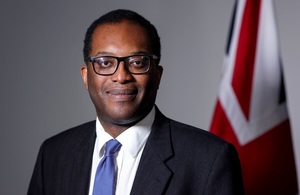-
International Trade Secretary secures agreement in principle on a digital trade deal with Singapore.
-
The Digital Economy Agreement (DEA) – the world’s most comprehensive digital trade agreement – will capitalise on our strengths as the world’s second largest services exporter and leading digital hub.
-
More opportunities for UK and Singapore firms to target advanced, tech savvy and rapidly expanding markets in Asia and the UK.
The UK has today (Thursday, December 9) secured an agreement in principle with Singapore for a Digital Economy Agreement (DEA) that will cut costs, slash red tape and pave the way for a new era of trade between both nations and the wider region.
It is the first digitally-focused trade agreement ever signed by a European nation. This comprehensive digital trade deal was agreed in record time by International Trade Secretary Anne-Marie Trevelyan and Singapore Minister-in-charge of Trade Relations S. Iswaran.
The DEA will take our trading relationship with Singapore – worth £16 billion in 2020 – to the next level by overhauling outdated trade rules that affect both goods and services exporters, making it easier for businesses to target new opportunities and build mutual prosperity in Singapore and the UK.
A third of UK exports to Singapore are already digitally delivered, and this deal will create new opportunities to expand digital trade. Services companies will be the big winners, from financial and telecoms giants like Standard Chartered or BT Group to software companies like Wales-based Awen Collective.
Singaporean businesses are welcome to invest and expand into the UK, the third largest tech sector in the world by venture capital investment. It is also a magnet for global talent and investment, with the third largest number of decacorns in the world after the US and China.
UK-founded tech unicorns are being created at a rate of almost one a week, and more will now be able to follow in the footsteps of companies like Revolut, Darktrace and Checkout.com who are already thriving in Singapore. Goods exporters will also benefit from streamlining border processes, while time-consuming and costly paperwork will be replaced with e-signatures, e-contracts and electronic payments.
Singapore is a gateway to the wider Indo-Pacific region and the DEA represents deepening trade ties as the UK looks to join Singapore and 10 other nations in the Comprehensive and Progressive Agreement for Trans-Pacific Partnership (CPTPP). Membership would mean access to a £8.4 trillion free trade area with vast opportunities for UK business.
International Trade Secretary Anne-Marie Trevelyan said:
This cutting-edge agreement with Singapore links two of the world’s most dynamic hi-tech hubs and plays to our strengths as pioneers in digital trade. Negotiated in just six months, it is the first digital trade deal ever signed by a European nation and will slash red tape, cut costs and support well-paid jobs across the whole UK.
Digital trade is creating a new global economy, but it is still largely governed by old- fashioned rules that pre-date the digital revolution of the past 20 years. We’re using our independent trade policy to strike ground-breaking agreements that update these rules for the digital age and connect UK businesses to the biggest and fastest growing markets in the world.
The DEA is the latest and most ambitious digital trade win following new agreements with Japan, Australia and New Zealand that all contain advanced digital chapters. Under the UK’s Presidency, G7 countries agreed on ground-breaking Digital Trade Principles in October, which will help to modernise trade and spread the benefits of technology more widely.
Wide-ranging benefits include closer links between two hi-tech and services hubs, modernised digital trade rules, and closer cooperation on industries of the future.
-
The DEA links two of the world’s most dynamic hi-tech and services hubs. It plays to our mutual strengths: UK as the second largest exporter of services, and Singapore as a tech-savvy nation at the heart of the booming ASEAN’s digital economy. Singapore businesses are welcome to expand and invest in UK’s flourishing tech sector – which has the third highest rate of VC investment globally.
-
The deal is set to create modernised rules for businesses of all sizes and across all sectors. It secures free and trusted cross border data flows, removing unnecessary data localisation requirements in the future. The deal also promotes digital trading systems and locks in high-data protection standards, making digital trade cheaper, faster, and more secure.
-
Future growth sectors like fintech, and lawtech can benefit from deep cooperation with another advanced economy – helping cement the UK’s position as a world leader in tech and a global services, digital and data hub.
Kara Owen, British High Commissioner to Singapore said:
I am delighted that the Digital Economy Agreement reached agreement in principle today. The UK is the first European nation to sign such a digitally-focused trade deal, and I am very proud we reached this milestone in just 6 months. 70% of our services exports to Singapore are already delivered digitally.
This ambitious deal will allow businesses to benefit from streamlined border processes and replacing costly paperwork with electronic contracts and payments. Not only does the DEA create a superhighway between UK and Asia, it also sets the standard for global digital trade rules.
Natalie Black, Her Majesty’s Trade Commissioner to Asia Pacific said:
The UK and Singapore have agreed the world’s most comprehensive digital trade deal. The next generation Digital Economy Agreement will provide modernised digital trade rules, remove barriers and help reduce costs for businesses. It is set to open a new era of digital trade across two of the world’s most digitally advanced countries. This ground-breaking model will also help the UK champion new trade opportunities in a regional digital economy projected to hit $1trn over the next decade.
ENDS
For media queries, contact:
Elizabeth Joseph
Communications Manager
British High Commission Singapore
elizabeth.joseph@fcdo.gov.uk

